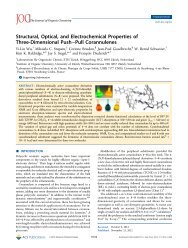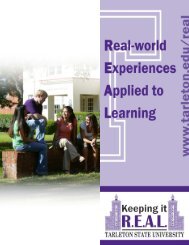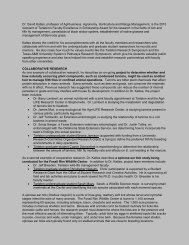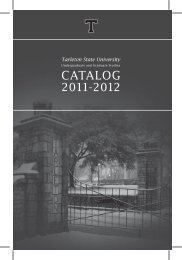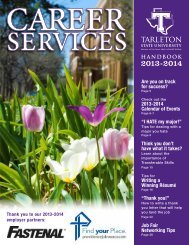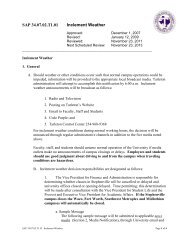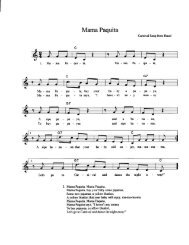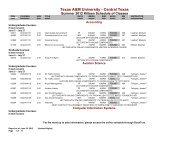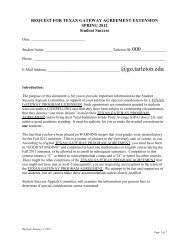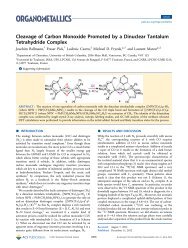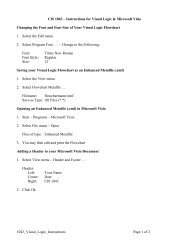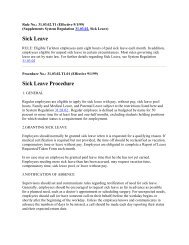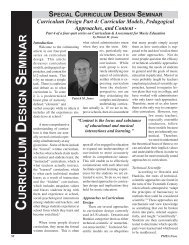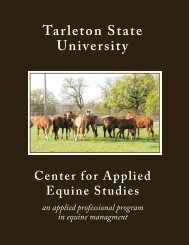ACBSP Quality Assurance Report March 2013 - Tarleton State ...
ACBSP Quality Assurance Report March 2013 - Tarleton State ...
ACBSP Quality Assurance Report March 2013 - Tarleton State ...
Create successful ePaper yourself
Turn your PDF publications into a flip-book with our unique Google optimized e-Paper software.
,<br />
Accreditation Council for Business Schools and Programs (<strong>ACBSP</strong>)<br />
<strong>Quality</strong> <strong>Assurance</strong> (QA) <strong>Report</strong><br />
for<br />
Baccalaureate/Graduate Degree Programs<br />
Current as of July 2012<br />
Overview (O) 1. Complete all information requested.<br />
Submit your report as an attachment to reports@acbsp.org on or before February 15th or September 15th.<br />
This report should be limited to maximum of 50 pages. The average length of most good reports is 30 pages. To help<br />
reduce the page numbers you can remove the <strong>ACBSP</strong> examples used in this report template to help you complete<br />
the report.<br />
O 2. Institution Name: <strong>Tarleton</strong> <strong>State</strong> University Date: <strong>March</strong> 22, <strong>2013</strong><br />
Address: 1333 West Washington Street, Stephenville, TX, 76402<br />
O 3. Year Accredited/Reaffirmed: 1991, 1998, 2011 This <strong>Report</strong> Covers Years: 2011-<strong>2013</strong><br />
O 4. List All Accredited Programs (as they appear in your catalog):<br />
Administrative Systems (BS/BBA), Accounting (BS, BBA), Finance (BS, BBA), Management (BS, BBA), Computer<br />
Information Systems (BBA), Economics (BBA), Human Resource Management (BBA), Marketing (BBA),<br />
Interdisciplinary Business (BBA), International Business (BBA), Business Administration (BS), International<br />
Economics (BS), Business Occupations (BAAS), Master of Business Administration (MBA), Management and<br />
Leadership (MS), Human Resource Management (MS).<br />
1
Note: Listing new programs here does not confer accreditation. New degree programs, majors or emphases must be in effect<br />
for at least two years and have graduates and follow the guidance in the process book before accreditation will be granted<br />
O 5. List all programs that are in your business unit that are not accredited by <strong>ACBSP</strong> and how you distinguish accurately to<br />
the public between programs that have achieved accredited status and those that have not.<br />
Only the programs listed in item O4 above are identified as having received accreditation by ACSBP in the <strong>Tarleton</strong><br />
<strong>State</strong> University (TSU) Catalog (page 112 of the 2012-<strong>2013</strong> TSU Catalog). The following programs are not <strong>ACBSP</strong><br />
accredited:<br />
Computer Information Systems (BS), Economics (BS), Technology Occupations (BSAS), Information Systems (MS).<br />
O 6. List all campuses that a student can earn a business degree from your institution:<br />
Main campus in Stephenville, TX; campus in Fort Worth – SW Metroplex TX; campus in Waco, TX.<br />
O 7. Person completing report Name: Adolfo Benavides, Dean, College of Business Administration<br />
Phone: 254-968-9496<br />
E-mail address: benavides@tarleton.edu<br />
<strong>ACBSP</strong> Champion name: Dr. Adolfo Benavides<br />
<strong>ACBSP</strong> Co-Champion name: Dr. Thomas Bradley<br />
O 8. Conditions or Notes to be Addressed: You do not need to address Opportunity for Improvement (OFI).<br />
The following notes are addressed in this QA <strong>Report</strong>:<br />
Standard Two, Criteria 2.1; Standard Three, Criteria 3.h, Standard Four, Criteria 4.1; and Standard Six, Criteria 6.1.<br />
2
We are kindly requesting that <strong>ACBSP</strong>’s Board of Commissioners remove the notes identified above based on the<br />
following justifications:<br />
Justification for the removal of the notes identified above:<br />
Standard two, criteria 2.1: With the arrival of Dr. Adolfo Benavides on July 1, 2010 as the new dean of the College of<br />
Business Administration, the goals and initiatives identified in the short term one year plan and new strategic plan were in the<br />
initial stages of deployment.<br />
The following were goals and initiatives that were still in progress when our last report was submitted in early 2011 but that<br />
have now been accomplished:<br />
1. We have received reaffirmation of our <strong>ACBSP</strong> accreditation.<br />
2. We have initiated membership in AACSB while maintaining our commitment to preserve our <strong>ACBSP</strong> accreditation.<br />
3. The faculty have approved the criteria for Academically and Professionally Qualified status as per AACSB guidelines.<br />
4. The faculty have approved a document with the tenure and promotion guidelines and expectations for the College of<br />
Business Administration faculty.<br />
5. We have hired twelve doctorally qualified faculty since 2011 (nine of them have been replacements for faculty who retired<br />
or left and three are net new positions to address the shortage of full-time faculty.) These new faculty are identified on<br />
Table 5.2 under Standard 5 of this QA <strong>Report</strong>.<br />
6. We have reviewed and revised the administrative structure of the College of Business Administration, have realigned the<br />
disciplines of Business Law and Real Estate into the Department of Accounting, Finance, and Economics.<br />
7. We have strengthened our commitment to shared governance by establishing Graduate and Undergraduate Curriculum<br />
Committees.<br />
8. We have established a College of Business Administration Student Advisory Board and have regular meetings two times<br />
per semester.<br />
9. We have established a College of Business Administration Executive Advisory Board and have regular meetings once per<br />
semester.<br />
10. We have implemented a process to support faculty engagement in research and scholarship by providing funding for<br />
faculty to present research papers at regional, national, or international conferences.<br />
3
Standard Three, Criteria 3.h: Due to severe budget reductions in 2011 and 2012, the College of Business Administration opted<br />
to administer the EBI Undergraduate Exit Survey, whose cost is approximately $2,000, on a thre3-year cycle instead of every two<br />
years. It was administered in the fall of 2010 and will be administered again in the fall of <strong>2013</strong>. This unavoidable cost-saving<br />
measure, however, has not diminished our resolve to continue to be aware of and sensitive to the needs of our students. The<br />
COBA Student Advisory Board, consisting of the leaders of the various student organizations along with the student senators<br />
representing the college’s students in the Student Government Association, has evolved as a key conduit of two way<br />
communication between the students and the College’s administration. The dean, department heads, and faculty advisors meet<br />
twice per semester with the Student Advisory Board to discuss issues of common interest and to listen to students concerns.<br />
Two important issues have surfaced from these meetings over the past two years: insufficient parking, particularly for students<br />
with physical disabilities, and lack of informal, common learning spaces. This, in turn, has resulted in two very tangible<br />
improvements that have added value for our student stakeholders: The number of handicapped parking spaces in the parking lot<br />
adjacent to the College of Business Administration building has increased from two to six. Secondly, an area of 900 square feet<br />
of storage space has been remodeled, furnished, and turned into a Student Lounge whose grand opening is scheduled for<br />
Thursday, April 11, <strong>2013</strong>. . Students provided input on the selection of the carpet and paint colors.<br />
Standard Four, criteria 4.1: A College of Business administration <strong>Assurance</strong> of Learning Committee has been established<br />
since our Self Study report submitted for our reaffirmation of <strong>ACBSP</strong> accreditation in early 2011. This committee has struggled<br />
with trying to implement practical ways to generate assurance of learning data for comparison among our different student<br />
segments (first-time in college traditional students; non-traditional, working adult undergraduate learners, working professionals in<br />
our graduate programs.) Our <strong>Assurance</strong> of learning System is already complex and is becoming too onerous for our faculty to<br />
support adding additional complexities whose marginal cost and effort would exceed their marginal benefit. To address the issue<br />
of comparison data for the various segments of our student body the <strong>Assurance</strong> of Learning committee has opted to use data on<br />
our different locations and / or programs as representative of our specific student segments. For example, the typical student in<br />
our main campus in Stephenville is a first time in college traditional student. Secondly, by the very nature of the degree program,<br />
those students pursuing the Bachelor of Applied Arts and Sciences are, generally speaking, working adult learners mainly in our<br />
off-campus locations in the Fort Worth Southwest Metroplex and in Waco. Lastly, a good proportion of our graduate students are<br />
young working professionals taking graduate classes in our off-campus locations or online.<br />
4
As reported in our 2011 Self Study <strong>Report</strong> and also in this QA <strong>Report</strong> for our programs that are offered in various locations<br />
(Stephenville, Ft. Worth, Waco, or online) we have the same learning goals, regardless of location, and systematically use the<br />
same measurements to collect data. The <strong>Assurance</strong> of Learning Committee reviews data by program and location, engages<br />
faculty teaching courses involved in the measurement, and out of this process, ultimately actions plans are developed and<br />
implemented for program improvement in response to assessment results.<br />
Standard Six, Criteria 6.1: Below is a detailed description of the process employed to determine how credits are assessed and<br />
awarded for student technical training and work experience.<br />
The Bachelor of Applied Arts and Sciences (BAAS) is designed for the student with training in a technical area. The College of<br />
Business Administration offers the BAAS in Business Occupations. This degree utilizes education received at technical schools,<br />
community or junior colleges, military technical schools, among others. The A student must have completed at least 12 semester<br />
credit hours (or equivalent) in technical training to be eligible for consideration. With official documentation on the dates, duration,<br />
content, and results / successful completion of the technical training in question, such training may be supplemented with a<br />
maximum of 21 semester credit hours for documented full-time work experience (four (4) semester credit hours per year of<br />
qualifying experience). A student must have a minimum of 33 semester hours and a maximum of 48 hours (or equivalent) of<br />
occupational specialization to be eligible for consideration for the BAAS degree. Beginning Fall 2008, a maximum of 33 semester<br />
hours of credit (or equivalent) may be awarded.<br />
The technical training taken into consideration for the BAAS degree must meet the following criteria: it must be related to subject<br />
matter taught in the department or college sponsoring the degree program; it must be documented via transcripts from<br />
community, junior, or technical colleges, vocational/technical schools, military transcripts, certificates of completion, Continuing<br />
Education Units (CEU’s), employer sponsored training records, etc. The work component of the occupational specialization must<br />
also meet the following criteria: it must be related to subject matter taught in the department or college sponsoring the degree<br />
program; it must be consistent in nature (multiple employers are acceptable, but the employment must be in a similar type of<br />
position); it must have made the individual a specialist in the field; it must be documented through employer statements,<br />
resumes, etc. to be considered.<br />
Each prospective BAAS student is evaluated individually to determine eligibility for the degree program. This begins with<br />
specialized academic advisors from those departments sponsoring the BAAS degree program. If a student is found to meet the<br />
criteria described above, sponsored degree plan applications are considered by the Interdisciplinary Degree Programs<br />
Committee (formerly known as the Bachelor of Applied Arts and Sciences Committee). This University committee, appointed by<br />
the Provost and Vice President for Academic Affairs and made up of faculty, department heads, staff from Enrollment<br />
5
Management, and representation from Student Life Studies, screens and reviews all potential Bachelor of Applied Arts and<br />
Science (BAAS) students and evaluates student credentials. Each degree plan for the BAAS degrees must be approved by the<br />
committee. Upon approval of this body, the student’s occupational specialization credits awarded are then posted to their<br />
academic transcript by the Office of the Registrar.<br />
We offer no special classes for students in our BAAS in Business Occupations, they enroll in the same classes that our other<br />
majors in our BBA and BS degree programs take and therefore are subject to the same academic requirements.<br />
6
O 9. The business unit must routinely provide reliable information to the public on their performance, including student<br />
achievement such as assessment results.<br />
The <strong>Quality</strong> <strong>Assurance</strong> <strong>Report</strong>, including results of student achievement in our assurance of learning program, is<br />
available through TSU’s College of Business Administration web page via a direct link<br />
List link here.<br />
Standard #1 Leadership<br />
Organization<br />
a. List any organizational or administrative personnel changes within the business unit since your last report.<br />
The following are the organizational and administrative changes that have occurred since our last report.<br />
Effective on September 1, 2012, Dr. Leah Schultz became the Computer Information Systems Department Head.<br />
Additionally, on October 1, 2012, Dr. Thomas Bradley was appointed Interim Head for the Management, Marketing, and<br />
Administrative systems Department.<br />
Lastly on January 15, <strong>2013</strong>, the academic disciplines of Business Law and Real Estate were realigned out of the<br />
Management, Marketing, and Administrative Systems Department into the Accounting, Finance, and Economics<br />
Department.<br />
b. List all new sites where students can earn an accredited business degree (international campus, off-campus or on<br />
campus, on-line) that have been added since your last report?<br />
In the spring semester of 2012 we started offering selected business classes on the campus of Navarro<br />
Community college in Midlothian, Texas but no full program leading to an accredited business degree is<br />
available there at this stage.<br />
7
Standard #2 Strategic Planning (this standard not typically addressed in the QA report) This is used as a place holder to allow<br />
all the other standards to be addressed in the QA report and keep the numbering system consistent with self-studies and QA<br />
reports.<br />
8
Standard #3 Student and Stakeholder Focus<br />
Complete the following table. Provide three or four examples, reporting what you consider to be the most important<br />
data. It is not necessary to provide results for every process.<br />
Standard 3 - Student and Stakeholder-Focused Results<br />
Student- and Stakeholder-Focused Student- and stakeholder-focused results examine how well your organization<br />
Results<br />
satisfies students and stakeholders key needs and expectations.<br />
Performance measures may include: satisfaction and dissatisfaction of current<br />
and past students and key stakeholders, perceived value, loyalty, persistence, or<br />
other aspects of relationship building, end of course surveys, alumni surveys,<br />
Internship feedback, etc.<br />
Measurement instrument or processes may include end of course surveys, alumni<br />
surveys, Internship feedback, etc.<br />
Each academic unit must demonstrate linkages to business practitioners and<br />
organizations, which are current and significant, including an advisory board.<br />
Performance<br />
Measure<br />
Measurable goal<br />
What is your<br />
goal?<br />
What is your<br />
measureme<br />
nt<br />
instrument<br />
or process?<br />
(Indicate<br />
length of<br />
cycle)<br />
Current<br />
Results<br />
What are<br />
your current<br />
results?<br />
Periodic surveys should be made of graduates, transfer institutions, and/or<br />
employers of graduates to obtain data on the success of business programs in<br />
preparing students to compete successfully for entry-level positions.<br />
Analysis of Results<br />
Analysis of<br />
Results<br />
What did<br />
you learn<br />
from the<br />
results?<br />
Action Taken or<br />
Improvement<br />
made<br />
What did you<br />
improve or<br />
what is your<br />
next step?<br />
9<br />
Insert Graphs or Tables of Resulting Trends<br />
(3-5 data points preferred)
Student<br />
satisfaction with<br />
support for job<br />
search will<br />
exceed 5.0<br />
Mean Score on<br />
a 0.0 (very<br />
dissatisfied) to<br />
7.0 (very<br />
satisfied) point<br />
Likert scale<br />
Students will<br />
express a high<br />
level of<br />
satisfaction with<br />
Common<br />
learning spaces<br />
in the College of<br />
business<br />
building<br />
EBI<br />
Undergrad<br />
Exit Survey<br />
every three<br />
years<br />
Twice per<br />
semester<br />
meetings<br />
with the<br />
Student<br />
Advisory<br />
Board<br />
representing<br />
the student<br />
body<br />
Mean score<br />
was 3.98 in<br />
Fall 2010<br />
Survey<br />
Persistent<br />
dissatisfacti<br />
on with lack<br />
of informal,<br />
common<br />
learning<br />
spaces in<br />
COBA<br />
building<br />
expressed<br />
in 201-<br />
2012<br />
meetings.<br />
Location of<br />
university’s<br />
Career<br />
Services<br />
Center<br />
discourage<br />
d students<br />
from<br />
seeking job<br />
placement<br />
assistance<br />
Generation<br />
NeXt<br />
students<br />
have a<br />
need for<br />
informal<br />
learning<br />
spaces<br />
Institutionalized<br />
four hours per<br />
week for a<br />
Career<br />
Services<br />
Counselor to<br />
hold office<br />
hours in the<br />
College of<br />
business<br />
building<br />
Secured<br />
funding to<br />
convert a large<br />
storage space<br />
(approx. 900<br />
sq. ft.) into a<br />
student lounge.<br />
Work is nearly<br />
completed and<br />
will open up for<br />
student use on<br />
April 11, <strong>2013</strong><br />
Career Services Office hours per Week in the<br />
College of Business Administration:<br />
2010-2011: 0 hours per week<br />
2011=2012: 4 hours per week<br />
Sq. Ft. in COBA building available as<br />
common/informal learning space /student lounge.<br />
2010-2011: 0 Sq. Ft.<br />
After April <strong>2013</strong>: 900 Sq.Ft.<br />
10
Students will<br />
express a high<br />
level of<br />
satisfaction with<br />
the physical<br />
facilities that<br />
affect their<br />
education<br />
Twice per<br />
semester<br />
meetings<br />
with the<br />
Student<br />
Advisory<br />
Board<br />
representing<br />
the student<br />
body<br />
Insufficient<br />
parking for<br />
student with<br />
physical<br />
disabilities<br />
We have to<br />
be<br />
sensitive<br />
and<br />
respond to<br />
the needs<br />
of all our<br />
students<br />
Worked with<br />
university<br />
administration<br />
and police<br />
department to<br />
increase the<br />
number of<br />
handicapped<br />
parking spaces<br />
in the college<br />
of business<br />
parking lot<br />
Number handicapped parking spaces in the<br />
College of Business Administration parking lot:<br />
2011: 2<br />
2012: 6<br />
11
Standard #4 Measurement and Analysis of Student Learning and Performance<br />
a. Program Outcomes<br />
List outcomes, by accredited program. Many of the program outcomes should be used as part of a student learning<br />
assessment plan and be measurable.<br />
UNDERGRADUATE PROGRAMS<br />
Accounting BBA/BS: Students will demonstrate proficiency / perform satisfactorily in the following:<br />
Ethical Behavior for Accountants<br />
Generally Accepted Accounting Principles<br />
Technological Skills<br />
Generally Accepted Auditing Standards<br />
Effective Communication<br />
Functional Areas of Business<br />
Application of Tax Code<br />
Administrative Systems BBA/BS: Students will demonstrate proficiency / perform satisfactorily in the following:<br />
Communication Skills<br />
Use of Technology<br />
Administrative Systems Knowledge<br />
General Business Knowledge<br />
Business Administration, B.S.: Students will demonstrate proficiency / perform satisfactorily in the following:<br />
Communication Skills<br />
Technology Skills<br />
General Business Skills<br />
12
Business Occupations, B.A.A.S: Students will demonstrate proficiency / perform satisfactorily in the following:<br />
Communication Skills<br />
Technology Skills<br />
General Business Skills<br />
Computer Information Systems, BBA: Students will demonstrate proficiency / perform satisfactorily in the following:<br />
Fundamental CIS and networking knowledge<br />
Fundamental business knowledge<br />
Communication skills<br />
Economics BBA/BS: Students will demonstrate proficiency / perform satisfactorily in the following:<br />
Theories and Institutions<br />
Problem Solving and Policy<br />
Technology<br />
Finance BBA/BS: Students will demonstrate proficiency / perform satisfactorily in the following:<br />
Basic financial concepts and problem solving<br />
Technical skills<br />
Effective communication skills<br />
Ethical behavior<br />
Human Resource Management BBA: Students will demonstrate proficiency / perform satisfactorily in the following:<br />
Effective Communication Skills<br />
General Business Knowledge<br />
Use of Technology<br />
Fundamental Knowledge in Human Resource Management<br />
13
Interdisciplinary Business, B.B.A.: Students will demonstrate proficiency / perform satisfactorily in the following:<br />
Communication Skills<br />
Technology Skills<br />
General Business Skills<br />
Management BBA/BS: Students will demonstrate proficiency / perform satisfactorily in the following:<br />
Communication<br />
Technology<br />
Management Skills<br />
General Business Knowledge/Skill<br />
Marketing BBA: Students will demonstrate proficiency / perform satisfactorily in the following:<br />
Effective Communication Skills<br />
Use of Technology<br />
Marketing Problems<br />
General Business Knowledge<br />
GRADUATE PROGRAMS<br />
Business Administration MBA: Students will demonstrate proficiency / perform satisfactorily in the following:<br />
Depth of Knowledge in Literature<br />
Critical Thinking<br />
Student Engagement and Research Practice and/or Training<br />
14
Human Resource Management MS: Students will demonstrate proficiency / perform satisfactorily in the following:<br />
Depth of Knowledge in Literature<br />
Problem solving and critical thinking<br />
Research, practice, and/or training<br />
Management and Leadership MS: Students will demonstrate proficiency / perform satisfactorily in the following:<br />
Problem solving and critical thinking<br />
Depth of Knowledge in Discipline Literature<br />
Ongoing student engagement in research, practice, and/or training experience<br />
15
. Performance Results<br />
Complete the following table. Provide three or four examples, reporting what you consider to be the most important<br />
data. It is not necessary to provide results for every process.<br />
Student Learning Results (Required for each accredited program, doctorate, masters, and baccalaureate)<br />
Performance Indicator<br />
Definition<br />
1. Student Learning Results A student learning outcome is one that measures a specific competency attainment.<br />
Examples of a direct assessment (evidence) of student learning attainment that might be used include:<br />
(Required for each accredited capstone performance, third-party examination, faculty-designed examination, professional<br />
program)<br />
performance, licensure examination).<br />
Add these to the description of the measurement instrument in column two:<br />
Direct - Assessing student performance by examining samples of student work<br />
Indirect - Assessing indicators other than student work such as getting feedback from the student or<br />
other persons who may provide relevant information.<br />
Formative – An assessment conducted during the student’s education.<br />
Summative – An assessment conducted at the end of the student’s education.<br />
Internal – An assessment instrument that was developed within the business unit.<br />
External – An assessment instrument that was developed outside the business unit.<br />
Comparative – Compare results between classes, between online and on ground classes, Between<br />
professors, between programs, between campuses, or compare to external results such as results from<br />
the U.S. Department of Education Research and Statistics, or results from a vendor providing<br />
comparable data.<br />
16
Performance<br />
Measure<br />
Measurable<br />
goal<br />
What is your<br />
goal?<br />
Accounting<br />
BBA/BS<br />
Ethical<br />
Behavior for<br />
Accountants,<br />
At least 70% of<br />
students in ACC<br />
423 (Ethics for<br />
Accountants)<br />
will achieve at<br />
least 70% on<br />
related exam<br />
questions<br />
What is<br />
your<br />
measureme<br />
nt<br />
instrument<br />
or process?<br />
Do not use<br />
grades.<br />
(Indicate<br />
length of<br />
cycle)<br />
direct<br />
formative<br />
internal<br />
comparative<br />
Formative<br />
internal<br />
Analysis of Results<br />
Current Analysis of<br />
Results Results<br />
What are your<br />
current<br />
results?<br />
79% in<br />
Stephenville72<br />
% in Waco<br />
What did you<br />
learn from the<br />
results?<br />
Trend<br />
continues to<br />
be positive in<br />
four year<br />
cycle<br />
Action<br />
Taken or<br />
Improveme<br />
nt made<br />
What did<br />
you<br />
improve or<br />
what is<br />
your next<br />
step?<br />
Added<br />
additional<br />
questions<br />
into<br />
questions<br />
bank<br />
Insert Graphs or Tables of Resulting Trends<br />
(3-5 data points preferred)<br />
Stephenville Waco<br />
08/09 95.%% N/a<br />
09/10 64.3% 73.7%<br />
10/11 72% 76%<br />
11/12 79% 72%<br />
17
Technological<br />
Skills. 70% or<br />
more of the<br />
students will<br />
score at least<br />
70% on related<br />
exam questions<br />
in ACC 301,<br />
Analysis using<br />
spreadsheets.)<br />
General Acctg<br />
Principles.. 70<br />
%or more of the<br />
students in ACC<br />
401 (Financial<br />
Acctg.) will<br />
score at least<br />
70% on related<br />
exam questions<br />
Formative<br />
internal<br />
Formative<br />
internal<br />
87% in<br />
Stephenville<br />
84% in Waco<br />
90% in<br />
Stephenville<br />
88.6% in<br />
Waco<br />
Declining<br />
trend in<br />
Stephenville<br />
Trend<br />
continues to<br />
be positive in<br />
four year<br />
cycle<br />
Added<br />
tutor in<br />
Acctg lab<br />
Added<br />
additional<br />
questions<br />
into<br />
questions<br />
bank<br />
Stephenville Waco<br />
08/09 85% 95%<br />
09/10 92% 80%<br />
10/11 91% 80%<br />
11/12 87% 84%<br />
Stephenville Waco<br />
08/09 94.4% 100%<br />
09/10 92.6% 88.9%<br />
10/11 89.2% 87%<br />
11/12 90.6& 88.6%<br />
Applied Arts &<br />
Science BAAS<br />
Verbal<br />
Communicatio<br />
n Skills. 75%or<br />
more of the<br />
students will<br />
score 70% or<br />
higher in GB 459<br />
(Bus. Strategy)<br />
oral presentation<br />
on scoring rubric.<br />
Formative<br />
internal<br />
100% in<br />
StephenvilleW<br />
aco,and SW<br />
Metroplex<br />
locations<br />
Trend<br />
continues to<br />
be positive in<br />
four year<br />
cycle<br />
No action<br />
taken Stephenville Waco<br />
08/09 100% 100%<br />
09/10 100% 100%<br />
10/11 100% 100%<br />
11/12 100% 100%<br />
18
Use of<br />
Technology<br />
70% or more of<br />
the students will<br />
score at least<br />
70% on related<br />
exam questions<br />
in ACC 301,<br />
Analysis using<br />
spreadsheets.)<br />
Formative<br />
internal<br />
78% in<br />
Stephenville<br />
95% in Waco<br />
Results are<br />
lower in<br />
Stephenville<br />
than in Waco<br />
Added<br />
tutor in<br />
Acctg lab<br />
in<br />
Stephenvill<br />
Stephenville Waco<br />
08/09 75% 100%<br />
09/10 75% 1005<br />
10/11 76% 90%<br />
11/12 78% 94%<br />
Economics<br />
BBA<br />
Use of<br />
technology.<br />
Students will<br />
score an avg. of<br />
70% or higher<br />
on assignments<br />
using Excel and<br />
web sites<br />
containing<br />
economic data<br />
Theories and<br />
institutions.<br />
Students in<br />
ECO 301<br />
Intermediate<br />
and 303 Money<br />
& banking will<br />
score at least<br />
an avg. 70% on<br />
comprehensive<br />
exams<br />
Formative<br />
internal<br />
Formative<br />
internal<br />
78%.<br />
Program<br />
offered in<br />
Stephenville<br />
only<br />
81%<br />
Program<br />
offered in<br />
Stephenville<br />
only<br />
Trend<br />
continues to<br />
be positive in<br />
four year<br />
cycle<br />
Trend<br />
continues to<br />
be positive in<br />
four year<br />
cycle<br />
No action<br />
taken<br />
Updated<br />
and<br />
expanded<br />
test bank<br />
Stephenville<br />
08/09 75%<br />
09/10 75%<br />
10/11 76%<br />
11/12 78%<br />
Stephenville<br />
08/09 77%<br />
09/10 78%<br />
10/11 85%<br />
11/12 81%<br />
Waco<br />
Waco<br />
19
Finance BBA<br />
Communicatio<br />
n skills. 100%<br />
of students will<br />
pass written &<br />
oral<br />
communication<br />
requirements in<br />
FINA 403<br />
(Cases in<br />
Finance)<br />
Formative<br />
internal<br />
86%<br />
Program<br />
offered in<br />
Stephenville<br />
only<br />
Declining<br />
trend was<br />
reversed in<br />
last year.<br />
Updated<br />
grading<br />
rubric<br />
Stephenville<br />
08/09 100%<br />
09/10 80.8%<br />
10/11 Class not<br />
offered<br />
11/12 86%<br />
Waco<br />
Basic financial<br />
concepts &<br />
problem<br />
solving.100%<br />
of students will<br />
achieve 80% or<br />
better in<br />
questions on<br />
exit exam in<br />
FINA 403<br />
Formative<br />
internal<br />
86%<br />
Program<br />
offered in<br />
Stephenville<br />
only<br />
Trend<br />
continues to<br />
be positive in<br />
four year<br />
cycle<br />
Reviewed<br />
revised<br />
and added<br />
more<br />
challenging<br />
questions<br />
to test<br />
bank<br />
Stephenville<br />
08/09 100%<br />
09/10 100%<br />
10/11 97%<br />
11/12 98%<br />
20
Human<br />
Resource<br />
Mgmt, BBA<br />
Use of<br />
technology.<br />
75% or more of<br />
students will<br />
score 70% or<br />
higher on<br />
related<br />
questions in<br />
related<br />
questions in CIS<br />
301<br />
Effective<br />
Communicatio<br />
n skills. 75% or<br />
more of<br />
students will<br />
score 70% or<br />
higher in oral<br />
presentation in<br />
GB 459<br />
(Business<br />
Strategy)<br />
Formative<br />
internal<br />
Formative<br />
internal<br />
79%<br />
Program<br />
offered in<br />
Stephenville<br />
only<br />
100%<br />
Program<br />
offered in<br />
Stephenville<br />
only<br />
Slightly<br />
declining<br />
trend<br />
Trend<br />
continues to<br />
be positive in<br />
four year<br />
cycle<br />
Added<br />
tutor in<br />
Acctg /CIS<br />
lab in<br />
Stephenvill Stephenville<br />
08/09 67%<br />
09/10 83%<br />
10/11 83%<br />
11/12 79%<br />
No action<br />
taken<br />
Stephenville<br />
08/09 67%<br />
09/10 100%<br />
10/11 94%<br />
11/12 100%<br />
21
Fundamental<br />
knowledge in<br />
HR Mgmt. 75%<br />
or more of<br />
students will<br />
score 70% or<br />
higher on<br />
related<br />
questions in<br />
Mgmt 403<br />
(wage & Salary<br />
Adm.) 404<br />
(Selection &<br />
Recruitment)<br />
405 (HR<br />
Devlpmt),and<br />
GB 434<br />
(Emplmt Law)<br />
Formative<br />
internal<br />
43% in 2010-<br />
2011.<br />
Measured<br />
every two<br />
years.<br />
Program<br />
offered in<br />
Stephenville<br />
only<br />
Reviewed<br />
revised<br />
syllabi in<br />
those<br />
classes to<br />
strengthen<br />
coverage in<br />
HR Law,<br />
Wage &<br />
salary<br />
Adm., and<br />
HR<br />
Developmt,<br />
and<br />
Selection &<br />
Recruitmnt<br />
Stephenville<br />
08/09 39.20%<br />
09/10 Measurements<br />
every two years<br />
10/11 43%<br />
11/12 Measurements<br />
every two years<br />
Interdiscplinry<br />
Business, BBA<br />
Verbal Comm.<br />
Skills. 75% or<br />
more of<br />
students will<br />
score 70% or<br />
higher in oral<br />
presentation in<br />
GB 459<br />
(Business<br />
Strategy)<br />
Formative<br />
internal<br />
84%<br />
Program<br />
offered in<br />
Stephenville<br />
only<br />
Stable trend<br />
in mid – 80%<br />
range, except<br />
for outlying<br />
year 09/10<br />
Will revise<br />
scoring and<br />
implement a<br />
scoring<br />
rubric<br />
Stephenville<br />
08/09 81.25%<br />
09/10 100%<br />
10/11 85%<br />
11/12 84%<br />
22
Use of<br />
Technology<br />
70% or more of<br />
the students will<br />
score at least<br />
70% on related<br />
exam questions<br />
in ACC 301,<br />
Analysis using<br />
spreadsheets<br />
Formative<br />
internal<br />
71%<br />
Program<br />
offered in<br />
Stephenville<br />
only<br />
Declining<br />
trend in last<br />
three years. .<br />
Added tutor<br />
in Acc/ CIS<br />
lab Stephenville<br />
08/09 64.5%<br />
09/10 75%<br />
10/11 73%<br />
11/12 71%<br />
Management<br />
BBA / BS<br />
Verbal Comm.<br />
Skills. . 75%or<br />
more of the<br />
students will<br />
score 70% or<br />
higher in GB<br />
459 (Bus.<br />
Strategy) oral<br />
presentation on<br />
scoring rubric<br />
Written Comm.<br />
Skills. 75%or<br />
more of the<br />
students will<br />
score 70% or<br />
higher in GB 459<br />
(Bus. Strategy)<br />
written case study<br />
per scoring rubric<br />
Formative<br />
internal<br />
Formative<br />
internal<br />
93%.<br />
Program<br />
offered in<br />
Stephenville<br />
only<br />
84%.<br />
Program<br />
offered in<br />
Stephenville<br />
only<br />
Trend<br />
continues to<br />
be positive in<br />
four year<br />
cycle<br />
Stable trend<br />
over four year<br />
cycle<br />
No action<br />
taken<br />
Revised<br />
scoring<br />
rubric to<br />
reflect more<br />
accurately<br />
expectations<br />
of written<br />
assignment<br />
Stephenville<br />
08/09 93%<br />
09/10 95%<br />
10/11 92%<br />
11/12 93%<br />
Stephenville<br />
08/09 80%<br />
09/10 90%<br />
10/11 86%<br />
11/12 84%<br />
23
Fundamental<br />
Knowledge in<br />
Mgmt. 75% or<br />
more of stdnts<br />
will score 70%<br />
or higher<br />
related exams<br />
questions in<br />
MGMT 301, 302<br />
302, 350, 407,<br />
and 421<br />
Marketing BBA<br />
Verbal Comm.<br />
Skills. . 75%or<br />
more of the<br />
students will<br />
score 70% or<br />
higher in GB<br />
459 (Bus.<br />
Strategy) oral<br />
presentation on<br />
scoring rubric<br />
Written Comm.<br />
Skills. 75%or<br />
more of the<br />
students will<br />
score 70% or<br />
higher in GB<br />
459 (Bus.<br />
Strategy) written<br />
case study per<br />
scoring rub<br />
Formative<br />
internal<br />
Formative<br />
internal<br />
Formative<br />
internal<br />
72%.<br />
Program<br />
offered in<br />
Stephenville<br />
only<br />
92%.<br />
Program<br />
offered in<br />
Stephenville<br />
only<br />
88%.<br />
Program<br />
offered in<br />
Stephenville<br />
only<br />
72% in 10/11<br />
Stable trend<br />
in mid 90%<br />
range in the<br />
four year<br />
cycle<br />
Stable trend<br />
over four year<br />
cycle<br />
Mapped<br />
course<br />
content in<br />
syllabi to<br />
ensure<br />
coverage of<br />
all essential<br />
topics<br />
No action<br />
taken<br />
Revised<br />
scoring<br />
rubric to<br />
reflect more<br />
accurately<br />
expectations<br />
of written<br />
assignment<br />
Stephenville<br />
08/09 33%<br />
09/10 Measured<br />
every two years<br />
10/11 72%<br />
11/12 Measured<br />
every two years<br />
Stephenville<br />
08/09 92%<br />
09/10 100%<br />
10/11 93%<br />
11/12 92%<br />
Stephenville<br />
08/09 80.7%<br />
09/10 90%<br />
10/11 86%<br />
11/12 88%<br />
24
GRADUATE<br />
PROGRAMS<br />
Master of<br />
Business<br />
Administration<br />
MBA<br />
Effective<br />
Decision-<br />
Making &<br />
Critical<br />
Thinking Skills<br />
70% or more of<br />
MBA students<br />
will perform at<br />
satisfactory<br />
level or higher<br />
on selected<br />
questions in the<br />
MBA<br />
comprehensive<br />
exam graded by<br />
faculty<br />
committee<br />
Formative<br />
internal<br />
92%.<br />
Program<br />
offered in<br />
Stephenville<br />
only<br />
Stable trend<br />
in mid 90%<br />
range in the<br />
four year<br />
cycle<br />
No action<br />
taken<br />
Stephenville<br />
08/09 85%<br />
09/10 100%<br />
10/11 88%<br />
11/12 92%<br />
25
Communication<br />
Skills. 85% of<br />
MBA students<br />
will perform at<br />
satisfactory level<br />
or above on<br />
written and oral<br />
presentations in<br />
selected MBA<br />
classes (graded<br />
per scoring<br />
rubric)<br />
Formative<br />
internal<br />
95%.<br />
Program<br />
offered in<br />
Stephenville<br />
only<br />
Stable trend<br />
in mid 80% to<br />
90% range in<br />
the 08/09 and<br />
09/10 years.<br />
No action<br />
taken.<br />
Faculty to<br />
consider<br />
adding new<br />
learning<br />
goal related<br />
to<br />
knowledge<br />
of literature<br />
in field<br />
Stephenville<br />
08/09 85%<br />
09/10 95%<br />
10/11 Not measured<br />
11/12 *<br />
<br />
This outcome/objective is being replaced by<br />
one related to Depth of Knowledge in he<br />
literature<br />
Master of<br />
Science in<br />
Human<br />
Resource<br />
Mgmt, MS<br />
Written<br />
Communication<br />
80% or more of<br />
students will<br />
perform at<br />
satisfactory level<br />
or higher in<br />
written part of<br />
comprehensive<br />
exam<br />
Formative<br />
internal<br />
100%<br />
Program<br />
offered<br />
online only<br />
Stable trend<br />
in mid 90%<br />
range in the<br />
four year<br />
cycle<br />
No action<br />
taken<br />
Online<br />
08/09 100%<br />
09/10 100%<br />
10/11 100%<br />
11/12 100%<br />
26
Problem<br />
solving &<br />
comprehensive.<br />
Knowledge in<br />
HR, 80% or<br />
more of<br />
students will<br />
perform at<br />
satisfactory level<br />
or higher in<br />
comprehensive.<br />
blind-graded<br />
exam<br />
Formative<br />
internal<br />
100%<br />
Program<br />
offered<br />
online only<br />
Stable trend<br />
in upper 90%<br />
range in the<br />
four year<br />
cycle<br />
No action<br />
taken<br />
online<br />
08/09 100%<br />
09/10 100%<br />
10/11 96%<br />
11/12 100%<br />
Master of<br />
Science in<br />
Mgmt &<br />
Leadership, MS<br />
Problem<br />
solving &<br />
critical thinking<br />
80% or more of<br />
students will<br />
score 80% or<br />
higher on<br />
selected case<br />
analyses in the<br />
MGMT 509<br />
capstone class<br />
Formative<br />
internal<br />
95%<br />
Program<br />
offered<br />
online only<br />
Stable trend<br />
in upper 90%<br />
range in the<br />
four year<br />
cycle<br />
No action<br />
taken<br />
online<br />
08/09 80%+<br />
09/10 100%+<br />
10/11 95%<br />
11/12 95%<br />
27
Professional<br />
Ethics 80% or<br />
more of students<br />
will score 80% or<br />
higher on ethics<br />
case analysis in<br />
the MGMT 509<br />
capstone class<br />
Formative<br />
internal<br />
90%<br />
Program<br />
offered<br />
online only<br />
Stable trend<br />
in upper 90%<br />
range in the<br />
four year<br />
cycle<br />
No action<br />
taken online<br />
08/09 80%+<br />
09/10 100%+<br />
10/11 95%<br />
11/12 90%<br />
Knowledge<br />
Depth in<br />
Literature 80%<br />
or more of<br />
students will<br />
score 70% or<br />
higher in<br />
comprehensive<br />
exam on Mgmt<br />
theory &<br />
concepts<br />
Formative<br />
internal<br />
100%<br />
Program<br />
offered<br />
online only<br />
Stable trend<br />
in upper 90%<br />
range in the<br />
four year<br />
cycle<br />
No action<br />
taken online<br />
08/09 N/A<br />
09/10 100%+<br />
10/11 Not measured<br />
11/12 100%<br />
Standard #5 Faculty and Staff Focus<br />
Complete the following table Provide three or four examples, reporting what you consider to be the most important data.<br />
It is not necessary to provide results for every process.<br />
28
Faculty and Staff Focused Results<br />
Faculty and staff-focused results examine how well the organization creates and<br />
maintains a positive, productive, learning-centered work environment for business<br />
faculty and staff.<br />
Performance<br />
Measure<br />
Measurable<br />
goal<br />
What is your<br />
goal?<br />
What is your<br />
measuremen<br />
t instrument<br />
or process?<br />
(Indicate<br />
length of<br />
cycle)<br />
Current<br />
Results<br />
What are<br />
your<br />
current<br />
results?<br />
Key indicators may include: professional development, scholarly activities, community<br />
service, administrative duties, business and industry interaction, number of advisees,<br />
number of committees, number of theses supervised, satisfaction or dissatisfaction of<br />
faculty and staff, positive, productive, and learning-centered environment, safety,<br />
absenteeism, turnover, or complaints.<br />
Analysis of Results<br />
Analysis<br />
of Results<br />
What did<br />
you learn<br />
from the<br />
results?<br />
Action Taken<br />
or<br />
Improvement<br />
made<br />
What did you<br />
improve or<br />
what is your<br />
next step?<br />
Insert Graphs or Tables of Resulting Trends<br />
(3-5 data points preferred)<br />
Table 5.1 Standard 5 - Faculty- and Staff-Focused Results<br />
29
Faculty<br />
satisfaction with<br />
support for<br />
pursing funded<br />
research will<br />
exceed 5.0<br />
Mean Score on<br />
a seven point<br />
Likert scale.<br />
0 = very<br />
dissatisfied to<br />
7.0 = very<br />
satisfied<br />
EBI Faculty<br />
Survey every<br />
three years<br />
Mean<br />
score<br />
was 2.62<br />
(slightly<br />
dissatisfi<br />
ed) in fall<br />
2010<br />
survey.<br />
Faculty<br />
need<br />
assistance<br />
in writing<br />
grant<br />
proposals<br />
Dean served<br />
on search<br />
committee to<br />
recruit a grant<br />
writer to assist<br />
faculty in<br />
searching for<br />
and submitting<br />
grant<br />
proposals and<br />
applications.<br />
Q033. Faculty Development - Satisfaction with the level<br />
of faculty development support you receive for<br />
enhancing your: Ability to secure funded research<br />
N = 29<br />
St<br />
d<br />
= 1.30<br />
De<br />
v<br />
Mean = 2.62<br />
2M<br />
N= 9<br />
S<br />
t<br />
1<br />
d<br />
.<br />
= 3<br />
D<br />
0<br />
e<br />
v<br />
One data point available, Next EFI faculty<br />
survey scheduled for fall <strong>2013</strong>.<br />
2M<br />
N= 9e<br />
a<br />
S n<br />
t<br />
1<br />
d =<br />
.<br />
= 3<br />
D 2<br />
0<br />
e<br />
v 6<br />
2<br />
30
Faculty<br />
satisfaction with<br />
support for to<br />
enhance their<br />
research will<br />
exceed 5.0<br />
Mean Score on<br />
a seven point<br />
Likert scale.<br />
0 = very<br />
dissatisfied to<br />
7.0 = very<br />
satisfied<br />
EBI Faculty<br />
Survey every<br />
three years.<br />
Next survey<br />
will be<br />
administered<br />
in fall of<br />
21013<br />
Mean<br />
score<br />
was 3.00<br />
(slightly<br />
dissatisfi<br />
ed) in fall<br />
2010<br />
survey.<br />
Support for<br />
research<br />
does lead<br />
to<br />
increased<br />
research<br />
productivity<br />
and,<br />
indirectly,<br />
to<br />
satisfaction<br />
with<br />
support<br />
Instituted<br />
internal<br />
monthly<br />
Research<br />
Seminar<br />
Series, and<br />
developed a<br />
process to<br />
fund up to<br />
$1,200 per<br />
faculty per<br />
year to<br />
present<br />
papers at<br />
conferences<br />
Total number of intellectual contributions, including<br />
journal articles, conf. proceedings, presentations,<br />
book chapters, etc:<br />
‘10/’11 academic yr. = 78<br />
‘11/’12 academic yr. 96, a 23% increase<br />
The increase in research productivity reflects the<br />
increase in support to engage in scholarly<br />
activities.<br />
20% or less of<br />
the faculty will<br />
be dissatisfied<br />
with salary<br />
compression /<br />
inversion<br />
problem<br />
Annual<br />
performance<br />
reviews and<br />
college-wide<br />
meetings<br />
50% of<br />
faculty<br />
are<br />
dissatisfi<br />
ed with<br />
salary<br />
compress<br />
inversion<br />
problem<br />
Compressi<br />
on /<br />
inversion<br />
problem is<br />
affecting<br />
morale and<br />
may lead<br />
to faculty<br />
turnover<br />
Received<br />
approval to<br />
use $100,000<br />
in funds un<br />
one half<br />
position plus<br />
additional<br />
funds from<br />
online course<br />
fees to begin<br />
addressing<br />
this issue<br />
No trend line exists yet but we expect the<br />
percentage of faculty dissatisfied with salary<br />
compression / inversion to decrease from current<br />
level of 50% over the next several years.<br />
Faculty Qualifications<br />
Complete Table 5.2 and 5.3 for new full-time and part-time faculty members since last self-study or QA report. Do not<br />
include faculty members previously reported.<br />
Table 5.2 Standard 5 - NEW FULL-TIME AND PART-TIME FACULTY QUALIFICATIONS<br />
31
NAME<br />
(List<br />
alphabetically<br />
by Last Name)<br />
MAJOR<br />
TEACHING<br />
FIELD<br />
COURSES<br />
TAUGHT<br />
(List the<br />
Courses<br />
Taught<br />
During the<br />
<strong>Report</strong>ing<br />
Period,<br />
Do Not<br />
Duplicate<br />
Listing)<br />
LIST ALL EARNED<br />
DEGREES<br />
(<strong>State</strong> Degree as<br />
Documented on<br />
Transcript, Must<br />
Include Major Field)<br />
DOCUMENT OTHER<br />
PROFESSIONAL<br />
CERTIFICATION<br />
CRITIERA<br />
Five Years Work<br />
Experience<br />
Teaching<br />
Excellence<br />
Professional<br />
Certifications<br />
<strong>ACBSP</strong><br />
QUALIFICATION<br />
1. Academically<br />
2. Professional<br />
3. Exception<br />
Baeza, Miguel<br />
(full-time)<br />
Bauer, Keldon<br />
(full-time)<br />
Esqueda, Omar<br />
(full-time)<br />
Jones, Dennis<br />
(full-time)<br />
Leach, Judd<br />
(full-time)<br />
Martinson,<br />
Brian<br />
(full-time)<br />
Management,<br />
International<br />
business.<br />
GB 103<br />
GB 444<br />
GB 591<br />
Finance FINA 301<br />
FINA 302<br />
FINA 400<br />
FINA 520<br />
Finance FINA 301<br />
FINA 401<br />
FINA 404<br />
FINA 520<br />
CIS<br />
CIS103<br />
CIS 518<br />
Bus. Law GB 432<br />
Human<br />
Resources<br />
Management<br />
GB 433<br />
MGMT 302<br />
MGMT 405<br />
MGMT 406<br />
BBA, MBA, Ph.D.,<br />
Bus. Administration,<br />
International<br />
Business<br />
BS, MBA,<br />
Ph.D.-Finance<br />
BBA,MBA,<br />
Ph.D.- Finance<br />
Academically<br />
(Doctoral)<br />
Academically<br />
(Doctoral)<br />
Academically<br />
(Doctoral)<br />
BA,MED, MBA, EDD<br />
Academically<br />
(Doctoral)<br />
BS, J.D.- Law Academically<br />
(Doctoral)<br />
BS, MBA,<br />
Senior Professional in Academically<br />
ABD, Management Human Resources, (Doctoral)<br />
(Ph.D. expected HR Certification<br />
spring <strong>2013</strong>) Institute<br />
32
Mullens, Drake<br />
(full-time)<br />
Notgrass,<br />
David (full-time)<br />
Schieck,<br />
Ashley<br />
(full-time)<br />
Schuessler,<br />
Joseph<br />
(full-time)<br />
Management MGMT 301<br />
MGMT 303<br />
GB 459<br />
Management /<br />
Leadership<br />
Acctg. Bus.<br />
Law<br />
MGMT301<br />
MGMT 325<br />
MGMT 501<br />
MGMT 510<br />
ACC 204<br />
ACC 204<br />
ACC 304<br />
CIS CIS 226<br />
CIS 302<br />
CIS 345<br />
CIS 511<br />
CIS 519<br />
BBA, MBA,<br />
ABD, Management<br />
(Ph.D. expected<br />
spring <strong>2013</strong>)<br />
BA, MBA, Ph.D.<br />
Leadership Studies<br />
BBA, MAS (Acctg.)<br />
J.D. - Law<br />
BBA.MBA, MS<br />
(CIS), Ph.D. - CIS<br />
Six years work<br />
experience<br />
Security +, Network +,<br />
A+,CompTIA.<br />
Three years teach.exp.<br />
Academically<br />
(Doctoral)<br />
Academically<br />
(Doctoral)<br />
Academically<br />
(Doctoral)<br />
Academically<br />
(Doctoral)<br />
Smith, Garry<br />
(full-time)<br />
Tanter, Alex<br />
(Part-Time<br />
Adjunct)<br />
Young, Arthur<br />
(full-time)<br />
Marketing MKTG 314<br />
MKTG 315<br />
MKTG 415<br />
MKTG 508<br />
Economics ECO 201<br />
ECO 203<br />
ECO 302<br />
ECO 304<br />
Accounting ACC 304<br />
ACC 435<br />
ACC 403<br />
ACC 424<br />
ACC 503<br />
BBA, MBA, Ph.D. -<br />
Marketing<br />
25 years work exp.,<br />
four yrs, teach.exp.<br />
BA, MA - Economics 12 yrs. work<br />
experience,5 yrs.teach<br />
exp.<br />
BS, MBA, Ph.D. -<br />
Accounting<br />
CPA<br />
Ten yrs. teach exp.<br />
Academically<br />
(Doctoral)<br />
Professionally<br />
Academically<br />
(Doctoral)<br />
33
Full-Time<br />
Faculty (45)<br />
Highst<br />
Deg<br />
Eard<br />
Baeza, Miguel Ph.D.<br />
Most Recent<br />
Year<br />
Prof.<br />
Cert.<br />
Table 5.3, Standard 5, Criterion 5.8<br />
Scholarly and Professional Activities<br />
Scholarly Activities – See Code Below<br />
Papers Published Unpublishe Consultg<br />
Present Articles/ d Articles/<br />
Manuscript Manuscripts<br />
s/Books /Books<br />
Professional Activities –See Note Below<br />
Profession Professional Professional<br />
al Related Conferences Meetings<br />
Services /<br />
Workshops<br />
D=1 D=1 1 1 2<br />
Year 2 B=1 1<br />
Bauer, Keldon Ph.D.<br />
Most Recent<br />
Year<br />
D=1 2 2<br />
Year 2 D=1 D=1 1 D=2 1 2<br />
Esqueda, Ph. D.<br />
Omar<br />
Most Recent<br />
B=4 B=2 C=2 1 2 2<br />
Year<br />
Year 2 D=2 D=1 C=2 2 2<br />
Professional<br />
Membrshps<br />
Jones, Dennis EDD<br />
Most Recent<br />
Year<br />
A=3 A=1 A=1<br />
D=2<br />
Year 2 A=2 A=1<br />
D=2<br />
3 2<br />
3 2<br />
34
Leach, Judd J.D. Tax<br />
Law<br />
License<br />
Most Recent<br />
Year<br />
Year 2<br />
Martinson,<br />
Brian<br />
Most Recent<br />
Year<br />
ABD<br />
HR<br />
cert.<br />
B=2 B=1 A=1<br />
C=1<br />
A=2 1 1<br />
2 2<br />
Year 2 A=1 D=2 C=2 1 2<br />
B=1<br />
Mullens, Drake ABD<br />
Most Recent<br />
B=1 B=1 A=1 1 1 2<br />
Year<br />
C=1<br />
C=2<br />
Year 2 D=1 A=1 1 1 2<br />
C=2<br />
D=1<br />
Notgrass, Ph.D. A=2 2<br />
David<br />
Most Recent<br />
B=2 B=1 A=1 1 1 2<br />
Year<br />
D=2<br />
Year 2 A=1<br />
2<br />
D=2<br />
Schieck, Ashley J.D. CPA<br />
Most Recent<br />
A=2 3<br />
Year<br />
Year 2 A=1 2<br />
Schuessler, Ph.D. Sec.+,<br />
Joseph<br />
Ntwk+<br />
Most Recent<br />
D=1 D=2 A=1<br />
2 2<br />
Year<br />
D=2<br />
Year 2 D=1 C=2 1 1<br />
35
Smith ,Garry Ph.D.<br />
Most Recent<br />
D=2 D=2 A=3 1 2 3<br />
Year<br />
Year 2 D=1 1 1 3<br />
Young, Arthur Ph.D. CPA<br />
Most Recent<br />
A=1 D=1 1 A=1 2 1 2<br />
Year<br />
D=1<br />
Year 2 D=1 D=2 A=1 1 2<br />
Tanter, MA<br />
Alex<br />
Most Recent<br />
1 A=2 1<br />
Year<br />
Year 2 1 1<br />
36
Standard #6 Educational and Business Process Management<br />
a. Curriculum<br />
1. List any existing accredited degree programs/curricula that have been substantially revised since your last report and<br />
attach a Table - Standard 6, Criterion 6.1.3 – Undergraduate CPC Coverage for each program.<br />
N programs have undergone substantial revisions since our last report.<br />
2. List any new degree programs that have been developed and attach a Table - Standard 6, Criterion 6.1.3 –<br />
Undergraduate CPC Coverage for each new program since your last report.<br />
No new programs have been developed since our last report..<br />
Note: If you have a new degree at a level currently accredited by <strong>ACBSP</strong>, then report information on: student enrollment,<br />
program objectives, instructional resources, facilities and equipment, admissions requirements, graduation statistics, core<br />
professional components (CPCs) and the outcomes assessment process to <strong>ACBSP</strong>. If the new degree is at a higher level<br />
then what is currently accredited, the school must complete a self-study to add the degree.<br />
3. List any accredited programs that have been terminated since your last report.<br />
O accredited programs have been terminated since our last report.<br />
37
Complete table 6.1. Provide three or four examples, reporting what you consider to be the most important data. It<br />
is not necessary to provide results for every process.<br />
Table 6.1 Standard 6 - Organizational Performance Results<br />
5. Organizational Effectiveness Organizational effectiveness results examine attainment of organizational goals. Each<br />
Results<br />
business unit must have a systematic reporting mechanism for each business<br />
program that charts enrollment patterns, student retention, student academic<br />
success, and other characteristics reflecting students' performance.<br />
Performance<br />
Measure<br />
Measurable<br />
goal<br />
What is your<br />
goal?<br />
What is your<br />
measurement<br />
instrument or<br />
process?<br />
(Indicate<br />
length of<br />
cycle)<br />
Key indicators may include: graduation rates, enrollment, improvement in safety, hiring<br />
equity, increased use of web-based technologies, use of facilities by community<br />
organizations, contributions to the community, or partnerships, retention rates by<br />
program, and what you report to governing boards and administrative units.<br />
Analysis of Results<br />
Current<br />
Results<br />
What are<br />
your<br />
current<br />
results?<br />
Analysis<br />
of Results<br />
What did<br />
you learn<br />
from the<br />
results?<br />
Action Taken<br />
or<br />
Improvement<br />
made<br />
What did you<br />
improve or<br />
what is your<br />
next step?<br />
Insert Graphs or Tables of Resulting Trends<br />
(3-5 data points preferred)<br />
38
Number of fulltime<br />
faculty per<br />
total Student<br />
Credit Hours<br />
generated.<br />
Increase fulltime<br />
faculty by<br />
10 to 12 net<br />
new faculty<br />
lines by 2020-<br />
2021<br />
Our Goal:<br />
One full-time<br />
faculty per<br />
every 300<br />
Semester Credit<br />
Hour generated<br />
Benchmarking<br />
data from peer<br />
institutions<br />
AACSB<br />
accreditation<br />
guidelines<br />
Four-year<br />
Undergraduate Undergraduate<br />
Presently<br />
we heave<br />
one full<br />
time<br />
faculty<br />
member<br />
for every<br />
380 SCH<br />
We are 10<br />
to12 fulltime<br />
faculty<br />
short of<br />
where we<br />
need to be<br />
Our request<br />
for a $19 per<br />
SCH tuition<br />
differential for<br />
business<br />
courses has<br />
been<br />
preliminary<br />
approved.<br />
Once final<br />
approval is<br />
granted, the<br />
additional<br />
funds will<br />
enable us to<br />
recruit for six<br />
or seven net<br />
new full-time<br />
faculty<br />
positions.<br />
Additionally,<br />
central<br />
administration<br />
has<br />
committed to<br />
budgeting<br />
one new<br />
faculty line<br />
per year.<br />
Continue to<br />
support<br />
39<br />
Semester Credit hours per full time faculty:<br />
2012-<strong>2013</strong>: 380 SCHs<br />
No trend line is available yet. We expect to bring<br />
the SCHs to about 300 per full-time faculty by 2020-<br />
2021.
Graduation<br />
Rate.<br />
Our Goal:<br />
Increase the<br />
four-year grad.<br />
rate of COBA<br />
graduates to<br />
45% by 2020<br />
Masters student<br />
one year<br />
retention rate.<br />
Our Goal:<br />
Increase the<br />
Masters<br />
students’ one<br />
year retention<br />
rate to 80% by<br />
2020<br />
Graduation<br />
Rates reported<br />
on request by<br />
Office of<br />
Institutional<br />
Research<br />
One year<br />
retention rates<br />
of masters<br />
students<br />
Rates reported<br />
on request by<br />
Office of<br />
Institutional<br />
Research<br />
35% in<br />
2012<br />
(2008<br />
cohort)<br />
73.1% in<br />
2012<br />
Five year<br />
trend is<br />
positive<br />
Five year<br />
trend is<br />
stagnant<br />
student<br />
engagement<br />
opportunities.<br />
Support<br />
university<br />
move to<br />
higher<br />
admission<br />
standards<br />
We are<br />
currently<br />
revising our<br />
leveling /<br />
Foundation<br />
courses for<br />
new students<br />
and reviewing<br />
our admission<br />
standards<br />
4 Yr Grad Rate<br />
2008 23.25%<br />
2009 25.6%<br />
2010 32.36%<br />
2011 32.8%<br />
2012 35%<br />
One Yr Master<br />
Retention Rate<br />
2008 72.1%<br />
2009 71.8%<br />
2010 70.9%<br />
2011 72.7%<br />
2012 73.1%<br />
40



